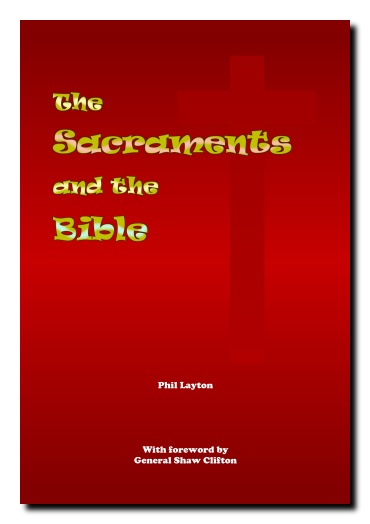Taking a fresh look at what Scripture actually says about the Sacraments
 only £2.99 Click here to buy now from Amazon  How can The Salvation Army justify non-adherence to
baptising them in the name of the Father and of the Son and of the Holy Spirit, Matthew 28 v19 |
The Sacraments and the Bible
A personal review and testimony by Andrew Kite from his perspective as a Salvationist who is a Local Officer, August 28th 2007. 'I was made to reconsider my whole
grasp on the subject.' A LOCAL OFFICER'S VIEW
As a newcomer to the Salvation Army I always took the answers I was given
by more experienced soldiers and officers to questions about the
sacraments.
I was told that we didn't have infant baptism as we had the child dedicated
to God by the parents as a primary commitment, solid and binding by the parents
and all the members of the Corps sharing in the child's spiritual development.
When that child was of an age to decide on, and agree to the conditions and
soldiership of the Salvation Army, then this was our "baptism".
I was also told that we did not celebrate the Eucharist as the presence of
wine in the early day Salvation Army meetings could cause problems with the
newly converted ex-alcoholic members; indeed that the wine could encourage
others to attend merely for the alcohol.
I was more than happy to accept these explanations, from what I knew they
seemed more than reasonable.
It was not until I read this book that I was confronted with a Bible-based
reason for the Salvation Army's non-conformity on the sacraments. I was willing
to say that every other denomination was correct and that the quirky old
Salvation Army was doing things the way it saw fit.
Reading the texts quoted by Captain Phil I was made to reconsider my whole
grasp on the subject.
I would not hesitate to point any future questioners to this book, and
maybe even take time to go through it with them. It may be that this subject
should be raised during enquiry and recruits classes to aid understanding.
I've been challenged on more that one occasion by fellow Christians telling
me that, as we don't practise baptism, we aren't "proper Christians". Now I have
the answer. We're "proper Christians" after all. Read the book.
Andrew Kite, Corps Treasurer, Canterbury Corps, UKT |
Click here to return the to main page and book rationale
